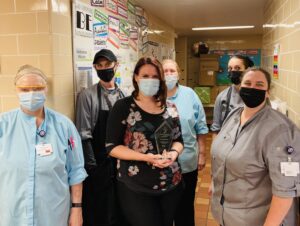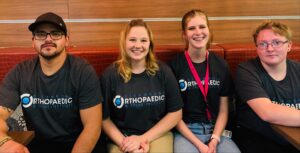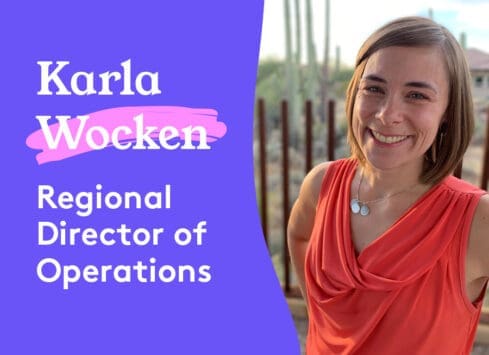Lessons Learned in Hospital Foodservice Management: Communication, Coaching and COVID-19
By Karla Wocken, Regional Director of Operations, Morrison Healthcare
Karla Wocken is a Regional Director of Operations with responsibility for 12 hospitals in Colorado, Kansas, Michigan, Wisconsin, and Wyoming, including Valley View Hospital in Glenwood Springs, Colorado.
Foodservice is in my blood.
I joined Morrison as an intern in 2009. Since then, I’ve been fortunate to put my skills to work in a variety of roles in the company. I’m a registered dietitian with several years of healthcare foodservice management experience, from leading hospital foodservice operations to designing and developing new technology that better serves patients and hospitals.
I am proud of this experience and grateful for these opportunities. But I’ve also learned that as people gradually move into management roles, they can become further removed from some essential daily tasks – and sometimes lose touch with important issues affecting patients and our associates.

It’s critical to stay close to both. As a result, I found that rolling up my sleeves and working the tray line with our frontline associates is one of the best ways to stay in touch with patients and associates. Our associates have gone above and beyond their regular duties during the pandemic, so it’s important to show them that leadership cares. I want to be that extra body who helps complete the breakfast meal service and gets ready for lunch. And with many hospitals filling back up again due to the COVID-19 outbreak, extra bodies are always in demand, regardless of job title.
I’ve only been an RDO for a short period and there has definitely been a learning curve. I needed to learn the retail food operations, as well as the culinary and finance sides of the business. But sometimes rolling up my sleeves and working with the team is the way to get the job done.
At the same time, with COVID-19 cases increasing, we need to be more innovative with fewer resources to help our patients and clients. Morrison is on the leading edge of using technology to make life easier for both. But sometimes we need to be flexible to adapt to meet patients’ and clients’ needs.
For example, we’ve brought a lot of technology to our patient dining experience. But we can’t lose sight of what is important to our patients in the current climate.
The Importance of Communications Skills
While many skills are needed to succeed in foodservice, communication is one of the most important. I have found that the most successful partnerships with hospital administrators, nurses, other medical personnel and foodservice associates are ones where I’ve developed an open line of communication.
Outside of formal meetings, judging how to navigate a new relationship can be difficult in a new hospital. Each hospital administrator has their own communication style, so developing a strong working relationship begins by understanding each person’s individual style.
Some people want regular updates on key operations; others want regular text messages and still others only want to hear from me if there is critical information they need to know. I’ve learned that being in tune with each person’s style goes a long way toward a successful relationship.
Helping Associates Succeed
While staying in tune with the needs of key hospital personnel is critical, it’s equally important to “pay it forward” by developing the careers of hourly associates and frontline managers.
With each associate in my region, I try to have a heart-to-heart conversation about their goals. I always ask “How do you want to move forward at this company, and how can I help?”

My management team and I have regular associate advancement discussions, but we need to ask those questions of our associates. Not everyone wants to be the next division president – and that’s ok. But if they want to advance, we have the resources to help them. One way is to get them enrolled in courses offered through the company’s Learning & Development department.
A second way – and it can be much more fun – is to take them outside of the four walls of their current hospital. Just as I did years ago, they can offer support at hospital openings and learn the process of how to provide foodservice at a new hospital from the ground up. They can also work with others on their same career path and begin to build a network of contacts – much as I did years ago back in St. Cloud, Minn., as an intern.
Given the right tools and training, a timeline can be established to prepare each person for their next job. And when the right opportunity comes along, they will be prepared.
At the same time, people’s lives at work and outside of work blend into one. And it means our management of these associates must take this into account.
For example, we all know the havoc caused by COVID-19 on millions of people’s lives. Many people have lost jobs, others are trying to make sure their children are still receiving a quality education while staying safe. And while we understand that clients and patients have high expectations for us, we are all human.
If we see an associate beginning to fall down on the job, we try to see how we can help. Many times, especially over the last 18 months, their performance is impacted by issues in their personal lives. We invite them to share what is going on at home and how we can assist. For example, if a mother or father wants to attend a meeting or event at their child’s school, but they are scheduled to work, how can we find a solution?
Managing a region is challenging. But as I said, foodservice is in my blood. With understanding, compassion and communication, there is usually a way to make it work for our patients, associates and our hospitals.




